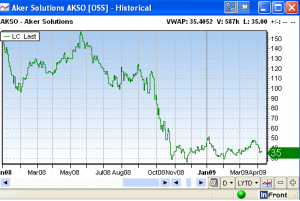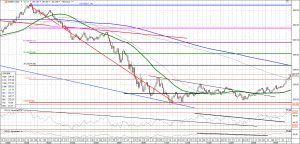I hope everyone has had a nice Easter, I know I've had; recharging my batteries, so to speak, and gotten some sun. But one case in particular has preoccupied me for the past couple of weeks, so I can might as well share some of my thoughts on the matter.
The summary of the situation is that Aker Solutions acquired ownership in a series of companies from the holding company Aker. Internal transactions are always vulnerable to speculations about proper pricing, and stresses the importance of proper Corporate Governance. For one thing the competencies and the independence of the different corporate boards of directors can result in the difference between a favorable and an unfavorable situation. My hypothesis is that the board of directors in Aker Solutions is too closely related to the Aker system. Simultanuously you have a complicating factor in that the Norwegian government is involved. The Norwegian Prime Minister was present at the Aker Day 2nd of April when the transactions were announced, and naturally got questioned about his thoughts on the matter. More about that later.
Aker
Aker ASA is an industrial ownership company consisting of the companies (ownership in percentages after adjusting for the transactions in question)
- Aker Floating Production (72.3%)
- Aker Drilling (100%)
- Aker Solutions (41.0%)
- Aker BioMarine (82.9%)
- Aker Seafoods (64.95%)
- Aker Exploration (76.1%)
- Aker Philadelphia Shipyard (50.3%)
- Aker Clean Carbon (50%)
The aker companies has a total of 26,500 employees spread across five continents and total operating revenues totaling NOK 65 billion for 2008.
Aker Solutions
Aker Solutions delivers engineering, construction, manufacturing, technology products, maintenance and other specialised services, often as total solutions for complete projects. Aker Kværner is the result of a merger between the Kværner Group and the Aker Maritime Group in 2002, and it got listed on the Oslo Stock Exchange in 2004. In April 2008, Aker Kværner changed the name to Aker Solutions.
Governmental involvement / Aker Holding
Aker Solutions’ largest shareholder is Aker Holding AS, with a 40.27 percent stake in the company. Aker Holding AS is owned by Aker ASA
(60 percent), the Norwegian Government (30 percent), SAAB AB (7.5 percent) and Investor AB (2.5 percent). The government got involved on June 22nd 2007, when Aker transferred its entire ownership of Aker Solution (40.27 %) to Aker Holding, and sold 40% of the latter for NOK 6.4 bn. This happened after international investors showed interest in the company, by reasons of wanting the company to remain in Norway. As this is not a post about protectionism I'll leave it at that for now. There are also questions about a put option that was given to the swedish investors, but again, I'll leave that for now.
The transactions
Aker Solutions is acquiring five companies at a total consideration of NOKbn 2 including shareholder loans (ownership in brackets):
- Aker Oilfield Services (100%)
- ODIM (33%)
- Aker DOF Supply (50%)
- Misund Bruk (100%)
- Aker Clean Carbon (50%)
It is worth noticing that a few of these companies undoubtedly prompts sound long-term gains for Aker Solution. The issue is the pricing involved. At the same time it seems weird to increase the capital expenditure requirements for the next couple of years by roughly NOK 2.5 bn and the debt ratio (NOK 2 bn in debt accounts for roughly 25% increase) in the mids of the financial environment we're in.
One company that seems additive for Aker Solution is the acquisition of Aker Oilfield Services, but while the valuation of comparables are down 50-90% over the past 18 months, the transaction involved a premium to prices at that point, which seems unreasonable at best. Similarly the ODIM stake seems just, except for being sold for a 16% premium over closing prices on the Oslo Stock Exchange previous day. The transfer of Aker DOF Supply (pretty much 6 AHTS (Anker Handling Tug Supply) ships) is more questionable.
The acquisition of Aker Clean Carbon is also interesting, as Aker Solution sold this to Aker in the first place and now pays a premium in order for it to be re-acquired. But the most questionable in the whole situation is the process.
The Aker value statement says "Aker ASA’s overriding concern is to create value via its ownership of well-run businesses that provide products and services in an environmentally sound, ethical, and socially responsible manner.", an interesting notion considering the situation in the first place.
Aker Solutions had a general assembly 1st of April 2009. Nothing about these transactions, however, were mentioned untill the Aker Day the 2nd of April. For transactions resulting in 25% increase in debt and capex increases it would've been nice for this to be mentioned in the documents for the general assembly, not to mention for it to be disclosed at this, not the following day.
As for Aker Holding, the equity agreement between the partners states that such a transaction in Aker Solution ASA is clearly a matter for the board of Aker Holding and the general assembly. However, the transactions were performed through a fully-owned subsidary of Aker Solution ASA named Aker Solution AS (note the difference in organization form, so it is actually two different companies).
Inquery into the transactions
The government has started an inquery into the transactions. The financial valuation will be performed by Pareto Securities, while the legalities will be considered by the lawfirms Simonsen and Selmer. The question is, what can happen even if they should conclude things to be non-favorable for Aker Solutions? Ultimately the responsibility is with the board of directors in the company. The government's representative in the Aker Holding board is now responsible for the investigation, after apparently reacting due to the stock market reaction to the news.

As one can see in the drop the past couple of days, it is down (rougly 13% the days directly after the announcement), on a montly basis it is down about 11% vs OBX (25 most traded shares on OSE, of which AKSO consists) which the past month is up 4.36%. The increased debt ratio and capex has also resulted in rating agencies taking matters into their own hands and prompting a negative watch on the rating (BBB- initially)
No matter what happens, it shows the importance of corporate governance when dealing with internal transactions, it will be interesting to see what the inquery concludes.



